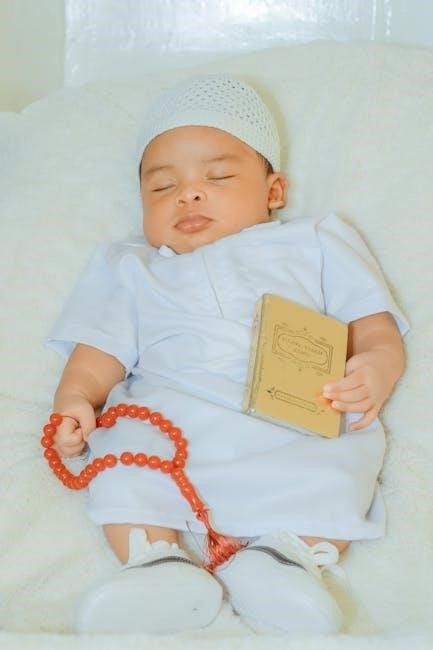Trevor Noah’s memoir, Born a Crime, is a heartfelt and humorous account of his childhood in apartheid-era South Africa. Born to a Black mother and white father, Noah’s existence was legally deemed a crime, shaping his unique perspective on race, culture, and identity. The book offers a poignant yet funny exploration of growing up under oppressive laws, blending personal stories with broader societal reflections.
Overview of Trevor Noah’s Memoir
Born a Crime is Trevor Noah’s memoir, recounting his upbringing in apartheid South Africa. Born to a Black mother and white father, Noah’s existence was illegal under apartheid laws. The book explores themes of race, identity, and culture through humorous and poignant storytelling. It delves into his childhood challenges, family dynamics, and survival strategies under a oppressive regime. Noah reflects on the complexities of his mixed heritage and the societal norms that shaped his experiences. The memoir is a powerful blend of personal narrative and historical context, offering insight into South Africa’s tumultuous past and its impact on individual lives.
The Significance of the Title “Born a Crime”
The title Born a Crime reflects Trevor Noah’s illegal birth under apartheid laws, which prohibited interracial relationships. His mother, a Black Xhosa woman, and father, a white Swiss-German, defied these oppressive regulations, making Noah’s existence a criminal act. The title captures the systemic racism and legal discrimination of the time, highlighting the absurdity of a system that criminalized love and mix-race children. It sets the tone for the memoir, blending personal narrative with broader societal critique, illustrating how Noah navigated a world where his very existence was deemed unlawful. The title encapsulates both his identity and the oppressive era he was born into.

Trevor Noah: A Brief Biography
Trevor Noah, born on February 20, 1984, is a South African comedian, television host, and author, best known for hosting The Daily Show and writing Born a Crime.
Early Life and Family Background
Trevor Noah was born in Johannesburg, South Africa, to a Black Xhosa mother, Patricia Nombuyiselo Noah, and a white Swiss-German father, Robert Noah. His parents’ interracial relationship was illegal under apartheid laws, making his birth a “crime.” Noah spent his early years in the township of Soweto, where he experienced the harsh realities of racial segregation. His mother played a pivotal role in shaping his identity, teaching him multiple languages and resilience. Despite the legal challenges, Noah’s upbringing was deeply rooted in his mother’s culture and strength, influencing his perspective on race and society.
Career Highlights and Achievements
Trevor Noah’s career skyrocketed as a stand-up comedian, earning global recognition. He became the first South African comedian to appear on The Tonight Show and Late Night with Jimmy Fallon. In 2015, he took over as host of The Daily Show, a role he held until 2022, using his sharp wit to address politics and social issues. His stand-up specials, such as Afraid of the Dark and Son of Patricia, received critical acclaim. Noah’s memoir, Born a Crime, became a bestseller, further cementing his status as a influential voice in comedy and commentary.
The Historical Context of Apartheid in South Africa
Apartheid, established in 1948, enforced racial segregation, privileging whites and oppressing Black South Africans. It ended in 1994 with Nelson Mandela’s leadership and democracy’s rise.
The Apartheid System and Its Impact on Society
Apartheid was a system of institutionalized racial segregation and discrimination in South Africa, enforced from 1948 to 1994. It classified people into racial groups, privileging whites while marginalizing Black, Colored, and Indian populations. Laws enforced separate housing, education, and employment, fostering inequality and oppression. Apartheid led to widespread poverty, violence, and social unrest, deeply dividing South African society. Its legacy continues to impact the nation, with systemic racism and economic disparities persisting long after its official end.
Illegal Interracial Relationships During Apartheid
Under apartheid, interracial relationships were strictly prohibited by law, with the Immorality Act of 1950 criminalizing such unions. Trevor Noah’s birth to a Black mother and white father made him a living violation of this law, rendering his existence illegal. This legal framework enforced racial purity and segregation, perpetuating a system of fear and control. The prohibition of interracial relationships was a cornerstone of apartheid ideology, aiming to maintain white supremacy and prevent racial mixing, which was seen as a threat to the regime’s power and social order.

Trevor Noah’s Unique Identity
Trevor Noah’s mixed heritage and illegal birth under apartheid defined his unique identity. As a biracial child in a racially divided society, his existence challenged oppressive laws and societal norms, shaping his perspective on race, culture, and belonging.
Being a Mixed-Race Child in South Africa
In apartheid South Africa, Trevor Noah’s mixed heritage made him an outcast. Born to a Black mother and white father, his existence was illegal under oppressive laws. This unique position shaped his identity, as he navigated a world where his mere presence challenged the system. Noah’s experiences as a mixed-race child were marked by both confusion and resilience, influencing his perspective on race, culture, and belonging. His story highlights the profound impact of apartheid’s racial segregation on individuals and families.
The Circumstances of His Birth and Upbringing
Trevor Noah’s birth in 1984 South Africa was a clandestine act, as interracial relationships were outlawed under apartheid. His mother, Patricia Nombuyiselo Noah, a Black Xhosa woman, and father, Robert, a white Swiss-German, defied the oppressive laws. Trevor’s upbringing in Johannesburg was marked by secrecy and danger, with his father largely absent to avoid detection. His mother’s courage and resourcefulness were central to his survival, shaping his early life amidst the harsh realities of apartheid. This illicit beginning profoundly influenced Noah’s worldview and identity, as detailed in Born a Crime.
The Structure and Themes of the Book
Born a Crime blends humor with poignant reflections, structured as a collection of personal stories. Themes of race, culture, and identity are central, offering insights into Noah’s experiences.
Storytelling Style and Narrative Structure
Trevor Noah’s Born a Crime is structured as a collection of vivid, personal stories, blending humor with heartfelt reflections. The narrative is non-linear, jumping between pivotal moments in his life, from childhood to adolescence. Noah’s storytelling style is conversational, making readers feel like they’re sharing intimate memories with a friend. He uses anecdotes to highlight the absurdities and challenges of growing up under apartheid, while also reflecting on broader themes like identity and resilience. This approach creates a compelling and relatable narrative that balances humor with profound insights into his experiences.
Themes of Race, Culture, and Identity
Born a Crime delves deeply into themes of race, culture, and identity, reflecting Trevor Noah’s experiences as a mixed-race child in apartheid South Africa. The memoir explores the complexities of racial classification and the societal tensions it creates, while also celebrating the richness of South African culture. Noah’s identity as a “bridge” between worlds is central to the narrative, offering a unique perspective on belonging and otherness. These themes are woven throughout the book, providing both personal and universal insights into the challenges and beauties of navigating a multicultural world shaped by historical and systemic divides.

Key Experiences and Stories from the Book
Trevor Noah shares vivid stories of his childhood, including his mother’s resilience, encounters with apartheid authorities, and humorous tales of navigating a complex, racially divided world;
Childhood Challenges and Family Dynamics
Trevor Noah’s upbringing was marked by both love and struggle. His mother, Patricia, a strong Black woman, defied apartheid laws by having a child with a white man. Noah often felt caught between his mother’s strict discipline and the absence of his father, who lived separately due to racial restrictions. Despite these challenges, Patricia instilled in Trevor a sense of self-worth, teaching him to navigate the complexities of his identity. Their bond, though fraught with difficulties, became a cornerstone of his resilience and humor.
Survival Strategies During Apartheid
In apartheid South Africa, Trevor Noah and his family employed various survival strategies to navigate the oppressive regime. His mother, Patricia, used her resourcefulness to protect him, often hiding his presence from authorities. Trevor learned to adapt, moving between different racial worlds, though this often left him feeling disconnected. The family relied on secrecy and resilience to overcome the systemic racism that threatened their existence. These experiences shaped Trevor’s understanding of identity and survival, ultimately influencing his humorous yet poignant perspective on life under apartheid.
The Reception of “Born a Crime”
Born a Crime received widespread critical acclaim and commercial success, becoming a New York Times bestseller. It earned numerous awards, including the NAACP Image Award.
Book Reviews and Literary Impact
Born a Crime received widespread critical acclaim for its blend of humor and poignant storytelling. Reviewers praised Noah’s ability to address serious issues like race and identity with wit and vulnerability. The memoir became a New York Times bestseller and won the NAACP Image Award for Outstanding Literary Work. Critics highlighted its unique perspective on apartheid-era South Africa, offering both personal and societal reflections. The book’s success solidified Noah’s reputation as a compelling storyteller and thinker, resonating with readers globally and sparking important conversations about race, culture, and belonging.
Commercial Success and Awards
Born a Crime achieved remarkable commercial success, debuting as a New York Times bestseller and maintaining its position for months. It sold millions of copies worldwide, establishing Noah as a prominent literary voice. The memoir earned the NAACP Image Award for Outstanding Literary Work and was named one of the best books of 2016 by The New York Times. Its success extended beyond the U.S., with translations in multiple languages, further amplifying its global reach and impact. The book’s popularity also led to a paperback edition and an audiobook narrated by Noah himself, enhancing its accessibility and appeal to a broader audience.

Trevor Noah’s Career Post-“Born a Crime”
After publishing Born a Crime, Trevor Noah continued to rise as a global figure, hosting The Daily Show and expanding into other ventures, solidifying his international influence.
Hosting “The Daily Show” and Global Recognition
Trevor Noah became the host of The Daily Show in 2015, bringing a fresh perspective to American satire and politics. His unique voice, shaped by his South African upbringing, resonated globally. The show tackled race, culture, and social issues, earning widespread acclaim. Noah’s witty commentary and ability to connect with diverse audiences elevated his international profile, making him a prominent figure in global media and comedy. His tenure on the show ended in 2022, but his influence remains significant in shaping modern political discourse and entertainment.
Other Ventures and Projects
Beyond The Daily Show, Trevor Noah has expanded his influence through various ventures. He founded Day Zero Productions, focusing on diverse storytelling in film and television. Noah has also embarked on successful stand-up comedy tours, connecting with global audiences. His philanthropic efforts, particularly in education and youth development in South Africa, highlight his commitment to giving back. These endeavors solidify his reputation as a multifaceted talent and a dedicated advocate for social change, ensuring his impact extends far beyond the stage and screen.
The Legacy of “Born a Crime”
Born a Crime has left an indelible mark on cultural conversations about race and identity. It continues to inspire global dialogue, cementing Noah’s role as a vital storyteller.
Cultural and Social Impact of the Memoir
Born a Crime has sparked global conversations about race, identity, and inequality. Its raw, personal storytelling has resonated widely, making it a catalyst for dialogue and reflection. By sharing his experiences, Noah has shed light on the complexities of apartheid’s legacy and its impact on individuals. The memoir has also played a role in educating readers about South Africa’s history and its ongoing social challenges. Its accessibility and humor have made it a powerful tool for fostering empathy and understanding, helping to break down cultural and racial barriers worldwide.
Its Role in Modern Conversations About Race
Born a Crime has become a significant voice in modern race discussions, offering a unique perspective on systemic racism and identity. Trevor Noah’s personal experiences, rooted in South Africa’s apartheid, provide a universal lens through which readers can understand racial injustice. The memoir bridges historical context with contemporary issues, making it a vital resource for addressing race today. Its relatable storytelling and humor have made it accessible, fostering empathy and sparking important conversations globally. Noah’s ability to connect his past to current struggles highlights the ongoing relevance of his story in the fight against racial inequality.
Born a Crime is a heartfelt memoir that captures Trevor Noah’s journey through apartheid, offering profound insights into race, identity, and resilience, leaving a lasting impact on readers.
Final Thoughts on the Book’s Importance
Born a Crime is a pivotal work that offers a raw, humorous, and deeply human perspective on growing up under apartheid. Trevor Noah masterfully weaves personal anecdotes with broader societal reflections, creating a narrative that resonates universally. The book’s ability to balance light-hearted storytelling with heavy themes like racism and identity makes it accessible and impactful. By sharing his experiences, Noah not only sheds light on South Africa’s tumultuous past but also sparks essential conversations about race, culture, and belonging in the modern world. Its relevance and emotional depth ensure its lasting influence.